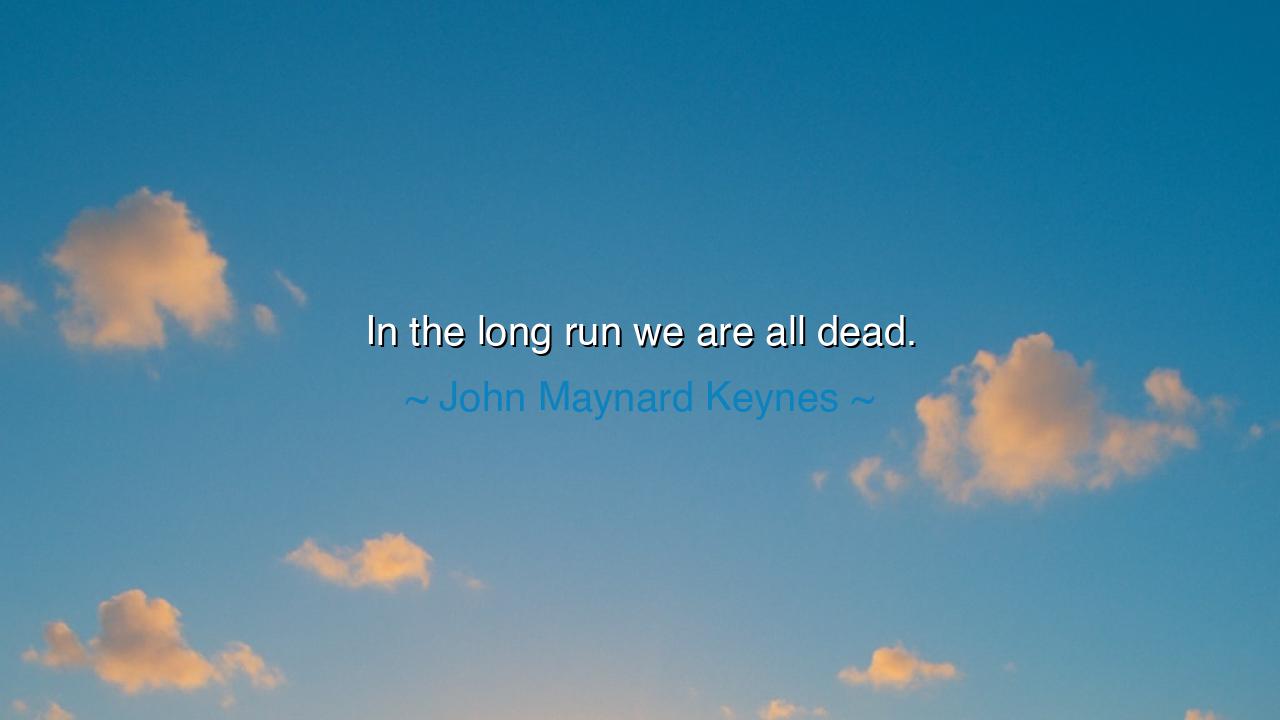
In the long run we are all dead.






“In the long run we are all dead.” Thus spoke John Maynard Keynes, the brilliant economist and philosopher of the modern age, a man who saw beyond numbers into the beating heart of human society. Though brief and sharp as a blade, this statement holds within it a profound and unsettling wisdom. It is not a cry of despair, as some imagine, but a call to urgency, a reminder that time is the most perishable of all resources, and that the actions we take—or fail to take—must serve the living, not the distant future. Keynes spoke not merely to economists, but to all who forget that life’s horizon is brief and that the duty of wisdom is not to dream endlessly of tomorrow, but to act today.
Keynes uttered these words in the early twentieth century, in the aftermath of war and economic ruin. Nations were obsessed with theories of the “long run”—those distant years when, economists promised, markets would correct themselves and prosperity would return. But Keynes, with a mind both rational and compassionate, saw the folly of such faith. “In the long run we are all dead,” he warned, meaning that the suffering of the present cannot be dismissed with the promise of some distant, eventual good. Men and women do not live in theoretical eternities—they live in the frailty of now. The starving cannot wait for the market to heal itself; the unemployed cannot wait for the invisible hand to turn. Thus, his words became a sword against indifference and a torch for practical compassion.
The ancients, too, understood the brevity of human existence. Seneca, the Stoic philosopher, wrote: “Life is long enough, and if you use it well, it is enough.” And yet he, like Keynes, lamented how men squander their hours as though eternity were theirs to command. Both understood the same truth: that mortality gives meaning to action. To know that “in the long run we are all dead” is not to fall into nihilism, but to awaken to the sacred urgency of the moment. It is to recognize that while the future may belong to time, the present belongs to us—and that we must build justice, mercy, and progress within the measure of our fleeting years.
Consider the story of Franklin D. Roosevelt during the Great Depression. When he took office, millions were jobless, starving, and hopeless. Many advisers counseled patience, saying that the economy would heal “in the long run.” But Roosevelt, echoing Keynes’s philosophy, rejected that fatal comfort. “People don’t eat in the long run,” he said, “they eat now.” And so he acted—launching programs to feed the hungry, employ the jobless, and restore the nation’s spirit. His courage to act in the present, rather than to wait for distant equilibrium, became the salvation of a generation. Here, Keynes’s insight found its living proof: that compassion delayed is compassion denied, and that the true measure of wisdom is timely action.
But Keynes’s quote reaches beyond politics and economics—it touches the heart of human existence. It speaks to every dream deferred, every love postponed, every kindness unspoken. How often do we say, “I will do it someday,” forgetting that someday may never come? In the long run, indeed, we are all dead—so why wait to live, to love, to serve, to change? The truth that seems grim is, in fact, liberating: it reminds us that life’s meaning lies in immediacy, not in endless preparation. Each sunrise is a summons to do now what tomorrow may never allow.
Yet his words are not a call to reckless haste, but to purposeful urgency. The “long run” is the mirage that tempts humanity to drift in complacency, to trade the living pulse of today for the phantom of security. The wise do not despise the future, but they do not worship it either. They understand that eternity is not measured in centuries, but in moments well-lived. To labor, to create, to show mercy now—this is to defy death’s inevitability, for every act of goodness ripples beyond the grave.
The lesson, then, is this: do not wait for the long run—act in the short run, for it is the only run you are given. In every sphere—whether in work, love, or justice—ask not what time will bring, but what you can bring to time. Be bold in compassion, swift in kindness, and fearless in the pursuit of what is right. For when you move with purpose, you redeem the brevity of life with the eternity of impact.
So remember the words of John Maynard Keynes: “In the long run we are all dead.” Let them not fill you with dread, but with resolve. For though death claims us all, it is the living who shape the world that endures beyond them. Therefore, do not measure life by its length, but by its depth. Act as though the present were sacred—because it is. And when your hour comes, you will not fear the long run, for you will have lived greatly in the fleeting glory of now.






AAdministratorAdministrator
Welcome, honored guests. Please leave a comment, we will respond soon